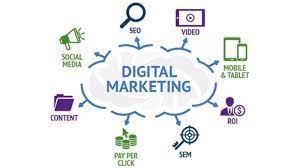The Power of Content Marketing in Digital Marketing
In the realm of digital marketing, content is king. Content marketing has emerged as a crucial strategy for businesses to engage with their target audience, build brand awareness, and drive conversions. By creating and distributing valuable, relevant, and consistent content, businesses can establish themselves as industry leaders and connect with customers on a deeper level.
Benefits of Content Marketing
Enhances Brand Visibility: High-quality content attracts attention and increases brand visibility across various online platforms.
Builds Trust and Credibility: Informative and valuable content helps build trust with consumers, positioning the brand as an authority in its industry.
Boosts SEO Performance: Search engines favour fresh, relevant content. A well-executed content marketing strategy can improve a website’s search engine rankings and drive organic traffic.
Drives Customer Engagement: Compelling content encourages audience interaction, leading to increased engagement and brand loyalty.
Key Elements of Effective Content Marketing
Audience Understanding: Tailor your content to meet the needs and preferences of your target audience for maximum impact.
Consistency: Regularly publishing high-quality content helps maintain audience interest and reinforces brand messaging.
Variety: Diversify your content formats (e.g., blog posts, videos, infographics) to cater to different audience preferences.
Call-to-Action (CTA): Include clear CTAs in your content to guide users towards desired actions such as signing up for a newsletter or making a purchase.
The Future of Content Marketing
In an increasingly competitive digital landscape, businesses must continue to evolve their content marketing strategies to stay relevant and engage with consumers effectively. Embracing emerging technologies such as AI-driven personalisation and interactive content experiences can help businesses create more impactful campaigns that resonate with their target audience.
In conclusion, effective content marketing is essential for businesses looking to succeed in the digital age. By crafting compelling narratives, providing value to consumers, and staying ahead of industry trends, businesses can leverage the power of content marketing to achieve their marketing goals and drive sustainable growth.
Understanding Content Marketing: Importance, Benefits, and Best Practices in Digital Marketing
- What is content marketing and why is it important in digital marketing?
- How does content marketing differ from traditional advertising?
- What are the key benefits of incorporating content marketing into a digital marketing strategy?
- How can businesses measure the effectiveness of their content marketing efforts?
- What are some best practices for creating engaging and shareable content in digital marketing?
What is content marketing and why is it important in digital marketing?
Content marketing is a strategic approach that involves creating and distributing valuable, relevant, and consistent content to attract and retain a target audience. In the realm of digital marketing, content marketing plays a pivotal role in establishing brand credibility, driving customer engagement, and boosting online visibility. By delivering informative and engaging content across various digital channels, businesses can build trust with their audience, differentiate themselves from competitors, and ultimately drive conversions. In essence, content marketing serves as a powerful tool for businesses to connect with consumers on a deeper level, showcase their expertise, and nurture long-lasting relationships in the digital landscape.
How does content marketing differ from traditional advertising?
In the realm of digital marketing, the distinction between content marketing and traditional advertising lies in their approach and objectives. Content marketing focuses on creating valuable, informative, and engaging content that resonates with the target audience, aiming to build relationships and trust over time. In contrast, traditional advertising typically involves direct promotional messages aimed at driving immediate sales or conversions. While traditional advertising is often interruptive and one-way in nature, content marketing seeks to educate, entertain, and inspire audiences through storytelling and relevant information. By providing value rather than solely promoting products or services, content marketing aims to foster long-term engagement and loyalty with consumers in a more subtle and authentic manner.
What are the key benefits of incorporating content marketing into a digital marketing strategy?
Incorporating content marketing into a digital marketing strategy offers a multitude of key benefits for businesses. Firstly, it enhances brand visibility by creating valuable and engaging content that attracts and retains the attention of the target audience. Secondly, it helps build trust and credibility with consumers by positioning the brand as an authority in its industry through informative and relevant content. Additionally, content marketing boosts SEO performance by improving search engine rankings through the publication of fresh and quality content. Moreover, it drives customer engagement by encouraging interaction with the audience, leading to increased loyalty towards the brand. Overall, integrating content marketing into a digital marketing strategy is essential for businesses seeking to establish a strong online presence and connect meaningfully with their customers.
How can businesses measure the effectiveness of their content marketing efforts?
Measuring the effectiveness of content marketing efforts is crucial for businesses to gauge the impact of their strategies and optimise future campaigns. Businesses can employ various metrics to evaluate the success of their content marketing initiatives, such as website traffic, engagement rates, conversion rates, social media shares, and lead generation. By tracking these key performance indicators (KPIs) and analysing data insights, businesses can gain valuable insights into the reach, resonance, and return on investment (ROI) of their content marketing efforts. This data-driven approach enables businesses to make informed decisions, refine their content strategies, and ultimately drive better results in the competitive digital marketing landscape.
What are some best practices for creating engaging and shareable content in digital marketing?
When it comes to creating engaging and shareable content in digital marketing, several best practices can help businesses maximise their impact. Firstly, understanding the target audience is crucial – tailoring content to their preferences and interests increases the likelihood of engagement and sharing. Consistency in publishing high-quality content maintains audience interest and builds brand credibility. Utilising a variety of content formats, such as videos, infographics, and interactive posts, caters to different audience preferences and enhances shareability. Including clear call-to-action prompts within the content encourages users to take desired actions, further amplifying engagement and reach. By following these best practices, businesses can create compelling content that resonates with their audience and drives meaningful interactions in the digital landscape.


